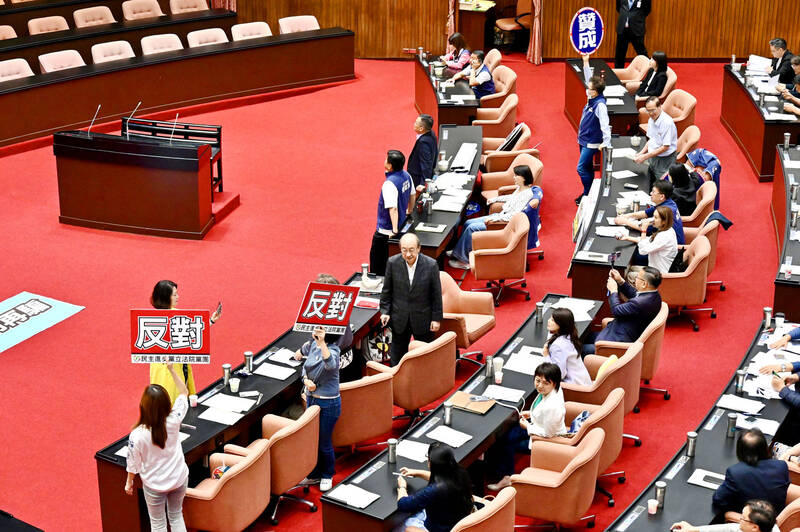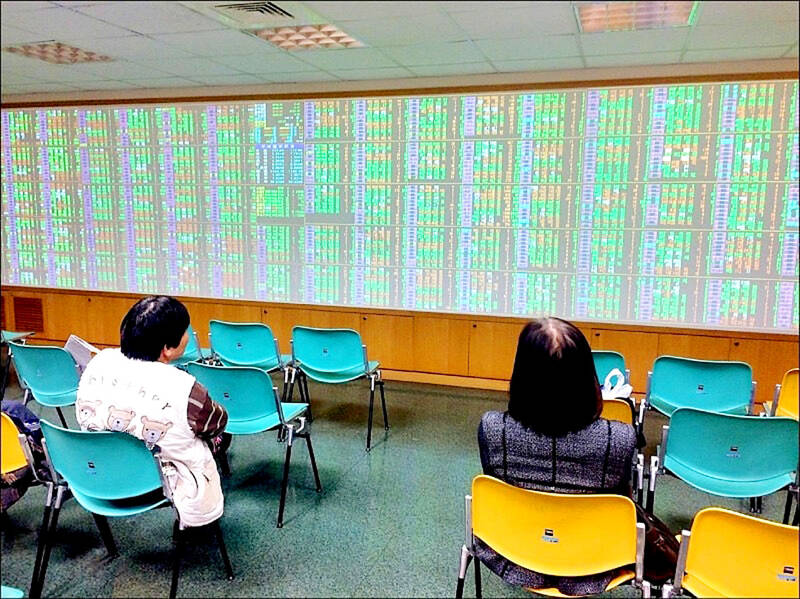This is a deeply unsettling period in Taiwan.
Uncertainties are everywhere while everyone waits for a small army of other shoes to drop on nearly every front. During challenging times, interesting political changes can happen, yet all three major political parties are beset with scandals, strife and self-inflicted wounds.
As the ruling party, the Democratic Progressive Party (DPP) is held accountable for not only the challenges to the party, but also the nation.

Photo courtesy of the Taiwan International Ports Corp
Taiwan is geopolitically and economically under threat. Domestically, the administration is under siege by the opposition-controlled legislature and growing discontent with what opponents characterize as arrogant, autocratic and seemingly endless rule by the DPP.
The DPP won an unprecedented third straight presidential election last year, but with only 40 percent of the vote in a three-way election. Nearly two-thirds of the electorate voted for another candidate, and deprived the party of its legislative majority.
It is rare in democracies for a party to win four terms in a row, and the odds are stacked against the DPP. To do so, they will need to boast nearly heroic levels of success in an unstable, unpredictable environment.

Photo: George Tsorng, Taipei Times
This year has unexpectedly turned into an election year. Thirty-one recall campaigns against Chinese Nationalist Party (KMT) lawmakers submitted signature counts high enough to meet the threshold to move to the actual recall phase, though some campaigns only barely passed the threshold and rejected signatures are likely to mean they will fail.
While over 20 may go to a public recall vote, some will fail. Estimates vary widely on how many will succeed and move on to a by-election, but the KMT is concerned that the DPP has a chance to replace the six lawmakers necessary for the DPP to regain a legislative majority.
The DPP is also planning to move up primaries for next year’s local elections to late this year. They were crushed in the 2022 local elections, winning only four out of 22 local government heads.

TT file photo
A lot is riding on President and DPP party Chairman William Lai (賴清德), who must be losing sleep over the enormity of the challenges.
With great power comes great migraines.
CHOPPY WATERS
Lai must calm nerves in a very volatile geopolitical and economic climate largely out of his control.
His administration must smooth relations with the US, but no one knows what the administration of President Donald Trump will do next. The administration speaks soothingly of trade talks proceeding, but provides no evidence that crushing tariffs and economic devastation can be averted.
If the administration fails to stem the threatened 32 percent tariffs, the wing of the KMT that has traditionally been skeptical of the US will make the most of it in a “we told you so” way.
Meanwhile, Taiwan’s other main trading partner across the strait is looking increasingly fragile economically and their export engine is facing serious challenges. Not only is the US slashing trade with China, countries around the world as far afield as Brazil and Russia are throwing up barriers, afraid of an onslaught of cheap, subsidized Chinese exports wrecking their economies.
Taiwan relies heavily on exporting the components and tools that fuel China’s exports.
China accounts for around 30 percent of the world’s manufacturing capacity. Beijing’s inflated economic data makes it hard to be certain, but it is unlikely that domestic consumption can absorb even a third of that capacity.
With the world closing their doors and whole industries like electric cars due for a major shakeout, China could face a meltdown in exports, the one remaining bright spot in their economy.
If this happens, Taiwan will be hit hard and, fairly or not, the Lai administration will be blamed.
If the US also slams Taiwan with tariffs, the economic damage and subsequent job losses could be devastating.
Meanwhile, military pressure against Taiwan by Beijing is increasingly regular and brazen. The head of the US Indo-Pacific Command, Admiral Samuel Paparo, has warned that on-and-off Chinese military exercises around Taiwan are not drills, but “rehearsals” for a potential invasion.
Adding to the uncertainty is an ongoing purge at the very top of the People’s Liberation Army (PLA) and growing rumors about Xi Jinping’s (習近平) hold on power.
If this results in negative impacts on Taiwan, the KMT will claim that if they had been in power, none of this would have happened.
The DPP’s credibility as the party best suited to protecting Taiwan’s sovereignty has been undermined by the indictment of four former DPP members for alleged acts of Chinese espionage, including assistants to a previous foreign minister and Lai himself when he was vice president.
SELF-INFLICTED WOUNDS
The administration is also hamstrung by budget cuts and freezes passed by the opposition-controlled legislature, forcing cabinet officials to go hat in hand to the legislature to beg for budgets to be unfrozen. Though both may be possible due to the selective nature of the cuts, the DPP seems determined to undermine their cries of poverty by simultaneously announcing big, new spending programs.
The cabinet also seems determined to annoy voters and undermine the recall campaigns.
They raised a big issue about changing authoritarian-era road names, which would cause considerable hassle and headache for people around the country. See Michael Turton’s excellent June 9 column “Notes from Central Taiwan: Renaming Taiwan’s roads: wrong move, wrong time” for why the DPP bungled this.
They walked that back, but some damage was done.
They also announced cuts to funding for local governments due to budget cuts. While there may be some justification for this, the threat that they would prioritize local subsidies for districts represented by lawmakers who supported the central government’s 2025 budget proposal was not, and people were outraged.
They also walked that back, but again, damage done.
The administration also claims that some services will have to be cut back due to the cuts, such as being unable to issue passports after October. Not everyone follows politics closely and will blame the DPP.
FACTIONAL PANDORA’S BOX
Factional infighting is also a risk for the DPP. Lai ended the previous balanced power-sharing arrangement spearheaded by his predecessor Tsai Ing-wen (蔡英文), and packed his administration with figures associated with himself and his New Tide faction.
This consolidation of power is not unusual and returns to pre-Tsai norms. But having reopened the factional Pandora’s Box, he will have to tread very carefully.
The factions are already openly warring ahead of party primaries for local leaders in places like Kaohsiung, Tainan and New Taipei City, though it is unclear how much this will damage the party nationally.
He is already concerned about factions fighting over candidates to run in by-elections in districts where the recall campaigns are successful. It is reported that he threatened the factions, “Do not talk about the by-elections now, those who do talk will not be nominated.”
In the 2022 local elections, both the DPP and KMT abandoned the more common opinion poll primaries to handpick the candidates personally. The KMT picked well and won big, the DPP’s Tsai picked poorly, sparking anger.
Though Lai and New Tide have consolidated considerable power, it is by no means absolute. If Lai follows Tsai’s lead and handpicks candidates, he might face a public backlash that could turn ugly.
Lai’s threat about the by-election suggests this could be his preferred option. That is risky.
A safer bet for much-needed party unity — both in the short and long term — would be careful cross-faction negotiations and transparency in the primary process.
As the ruling party, the DPP faces the most challenges, but they are more organised, disciplined and well-funded than their rivals, who face problems of their own.
Donovan’s Deep Dives is a regular column by Courtney Donovan Smith (石東文) who writes in-depth analysis on everything about Taiwan’s political scene and geopolitics. Donovan is also the central Taiwan correspondent at ICRT FM100 Radio News, co-publisher of Compass Magazine, co-founder Taiwan Report (report.tw) and former chair of the Taichung American Chamber of Commerce. Follow him on X: @donovan_smith.

Dissident artist Ai Weiwei’s (艾未未) famous return to the People’s Republic of China (PRC) has been overshadowed by the astonishing news of the latest arrests of senior military figures for “corruption,” but it is an interesting piece of news in its own right, though more for what Ai does not understand than for what he does. Ai simply lacks the reflective understanding that the loneliness and isolation he imagines are “European” are simply the joys of life as an expat. That goes both ways: “I love Taiwan!” say many still wet-behind-the-ears expats here, not realizing what they love is being an

Google unveiled an artificial intelligence tool Wednesday that its scientists said would help unravel the mysteries of the human genome — and could one day lead to new treatments for diseases. The deep learning model AlphaGenome was hailed by outside researchers as a “breakthrough” that would let scientists study and even simulate the roots of difficult-to-treat genetic diseases. While the first complete map of the human genome in 2003 “gave us the book of life, reading it remained a challenge,” Pushmeet Kohli, vice president of research at Google DeepMind, told journalists. “We have the text,” he said, which is a sequence of

Every now and then, even hardcore hikers like to sleep in, leave the heavy gear at home and just enjoy a relaxed half-day stroll in the mountains: no cold, no steep uphills, no pressure to walk a certain distance in a day. In the winter, the mild climate and lower elevations of the forests in Taiwan’s far south offer a number of easy escapes like this. A prime example is the river above Mudan Reservoir (牡丹水庫): with shallow water, gentle current, abundant wildlife and a complete lack of tourists, this walk is accessible to nearly everyone but still feels quite remote.

It’s a bold filmmaking choice to have a countdown clock on the screen for most of your movie. In the best-case scenario for a movie like Mercy, in which a Los Angeles detective has to prove his innocence to an artificial intelligence judge within said time limit, it heightens the tension. Who hasn’t gotten sweaty palms in, say, a Mission: Impossible movie when the bomb is ticking down and Tom Cruise still hasn’t cleared the building? Why not just extend it for the duration? Perhaps in a better movie it might have worked. Sadly in Mercy, it’s an ever-present reminder of just